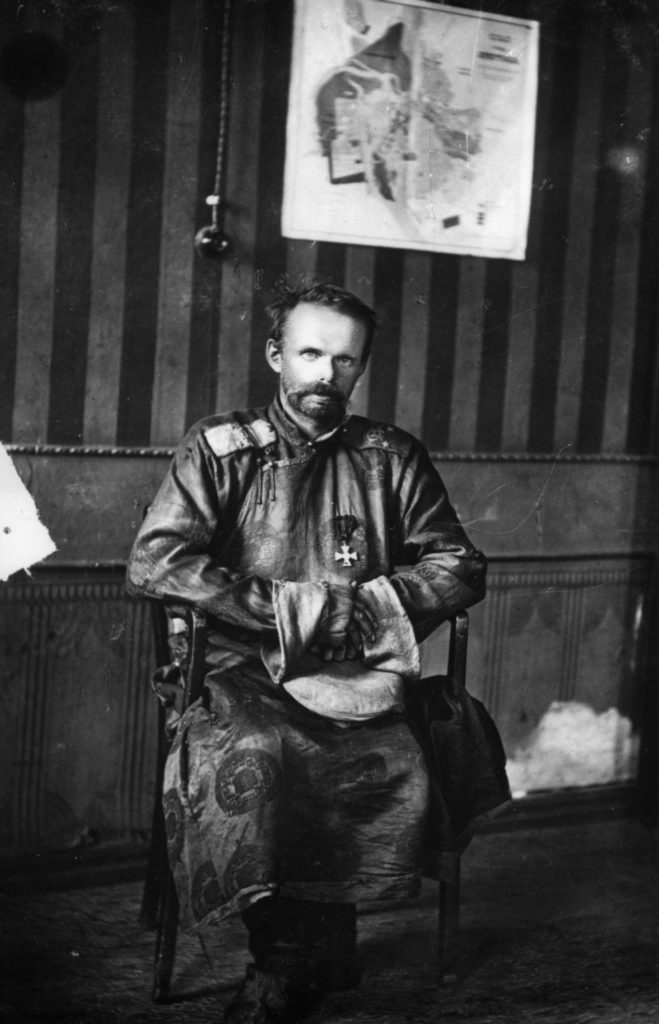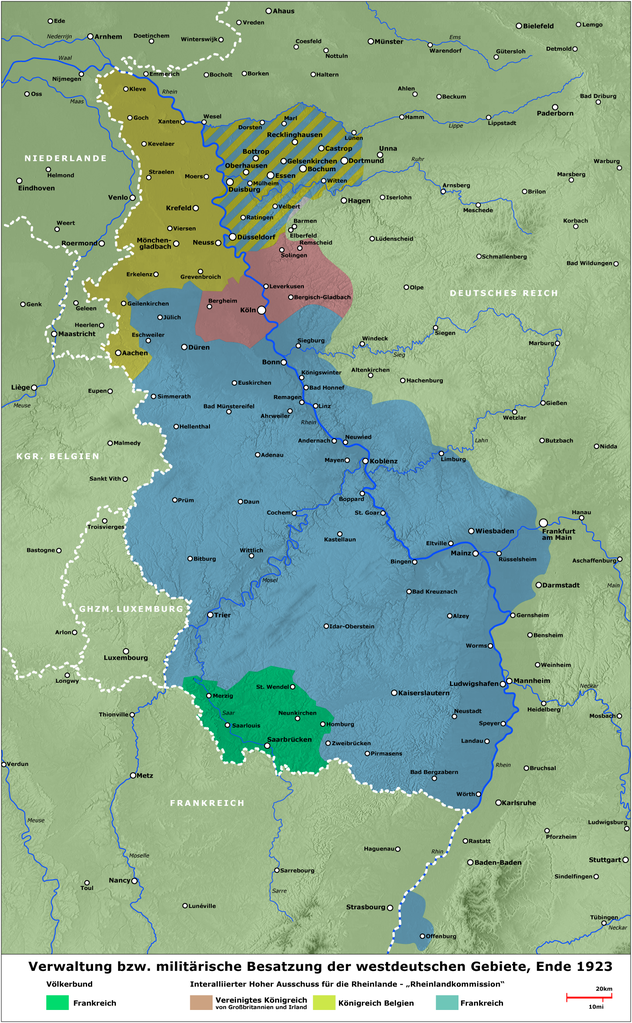White Mongolia and Shandong, China in tight spot
White Mongolia and Shandong, China in tight spot:

White Russian Baron R. F. von Ungern-Sternberg was accepted and recognized by most foreign powers and the League of Nations as the sole representative of Mongolia, much to his own surprise too. His White Russian, Mongol and even partly Chinese forces, cemented the monarhy of Bogd Khan in the now legitimate government of Mongolia. They seperated themselves from the Pan Mongolist Inner Mongolian Prince Fushenge, who later fell under Chinese rule again. Ungern-Sternberg's forces meanwhile annexed Tannu Uriankhai (Tuva) into White Mongolia. This strategy to not provoke China to much with possible plans of annexing Inner Mongolia earned Ungern-Sternberg and Bogd Khan the respect and later diplomatic recognition of White Mongolian independence by the Chinese. Relations between White Outer Monglians and Chinese, Pan-Mongolian or Pro-Japanese turned cold because of this. The Beiyang government quickly saw Bogd Khan/ Ungern-Sternberg' government in Ikh Khüree as a posible helpful buffer state and ally in the north, as fear of Soviet and Communist spillovers from the Russian Civil War grew that could overtrow their own government with their ideology too. The Chinese Government in Beijing was also in fear of more Japanese demands, since the nagotiation in Shandong/Shantung had allowed Japan special mining and zransportation rights, similar to Southern Mongolia.

Compared to the Japanese demands and plans to turn China into a Japanese Colony, Ungern-Sternberg White Russia in the north was a far lesser evil, as he had shown not to expand into Inner Mongolia, to increase his rule into the remaining Chinese state itself. But the ongoing Russian Civil War so close to the Chinese border they feared that the Red Army's Communist forces might attack them soon too. To prevent them from spreading their revolution, Ungern-Sternberg and supporting Chinese and Japanese forces invaded Siberia to support anti-Bolshevik rebellions and also fight against the remaining Red Army-Mongolian partisan that invaded White Mongolia constantly. So these counterrevolutionary forces attacked into Siberia, giving the White Forces there time to breath. But in Novonikolaevsk, Ungern-Sternberg was taken prisoner by the Red Army and some wanted to trial him for counterrevolution. But the protest notes from White Mongolia and China ensured that he was set free.

Ungern-Sternberg returned to White Mongolia in exchange for it's and China's neutrality in the ongoing Russian Civil War. The recognition of White Mongolia by the Lague of Nations and it's neighbors later also prevented Soviet and Mongolian People's Republic forces from attacking the nation from siberia once again in fear of a new escalation in Siberia/Mongolia and a all-open League of Nation intervention like in Turkey. And so Soviet involvement in Mongolia and China was prevented, with the exception of a few rebells and revolts. The Communist Party of Chinese and it's military branch, the Chinese Workers' and Peasants' Red Army never gained whide spread support among the Chinese peasents and workers, but other revolutionary ideas soon engulfed China in it's very own internaldispute and Civil War. The world and the League of Nations meanwhile shifted their attention westwards, were the Irish War of Independence tested the United Kingdom and Spain an France fought the Rif War in Marocco.

White Russian Baron R. F. von Ungern-Sternberg was accepted and recognized by most foreign powers and the League of Nations as the sole representative of Mongolia, much to his own surprise too. His White Russian, Mongol and even partly Chinese forces, cemented the monarhy of Bogd Khan in the now legitimate government of Mongolia. They seperated themselves from the Pan Mongolist Inner Mongolian Prince Fushenge, who later fell under Chinese rule again. Ungern-Sternberg's forces meanwhile annexed Tannu Uriankhai (Tuva) into White Mongolia. This strategy to not provoke China to much with possible plans of annexing Inner Mongolia earned Ungern-Sternberg and Bogd Khan the respect and later diplomatic recognition of White Mongolian independence by the Chinese. Relations between White Outer Monglians and Chinese, Pan-Mongolian or Pro-Japanese turned cold because of this. The Beiyang government quickly saw Bogd Khan/ Ungern-Sternberg' government in Ikh Khüree as a posible helpful buffer state and ally in the north, as fear of Soviet and Communist spillovers from the Russian Civil War grew that could overtrow their own government with their ideology too. The Chinese Government in Beijing was also in fear of more Japanese demands, since the nagotiation in Shandong/Shantung had allowed Japan special mining and zransportation rights, similar to Southern Mongolia.

Compared to the Japanese demands and plans to turn China into a Japanese Colony, Ungern-Sternberg White Russia in the north was a far lesser evil, as he had shown not to expand into Inner Mongolia, to increase his rule into the remaining Chinese state itself. But the ongoing Russian Civil War so close to the Chinese border they feared that the Red Army's Communist forces might attack them soon too. To prevent them from spreading their revolution, Ungern-Sternberg and supporting Chinese and Japanese forces invaded Siberia to support anti-Bolshevik rebellions and also fight against the remaining Red Army-Mongolian partisan that invaded White Mongolia constantly. So these counterrevolutionary forces attacked into Siberia, giving the White Forces there time to breath. But in Novonikolaevsk, Ungern-Sternberg was taken prisoner by the Red Army and some wanted to trial him for counterrevolution. But the protest notes from White Mongolia and China ensured that he was set free.

Ungern-Sternberg returned to White Mongolia in exchange for it's and China's neutrality in the ongoing Russian Civil War. The recognition of White Mongolia by the Lague of Nations and it's neighbors later also prevented Soviet and Mongolian People's Republic forces from attacking the nation from siberia once again in fear of a new escalation in Siberia/Mongolia and a all-open League of Nation intervention like in Turkey. And so Soviet involvement in Mongolia and China was prevented, with the exception of a few rebells and revolts. The Communist Party of Chinese and it's military branch, the Chinese Workers' and Peasants' Red Army never gained whide spread support among the Chinese peasents and workers, but other revolutionary ideas soon engulfed China in it's very own internaldispute and Civil War. The world and the League of Nations meanwhile shifted their attention westwards, were the Irish War of Independence tested the United Kingdom and Spain an France fought the Rif War in Marocco.
Last edited:




